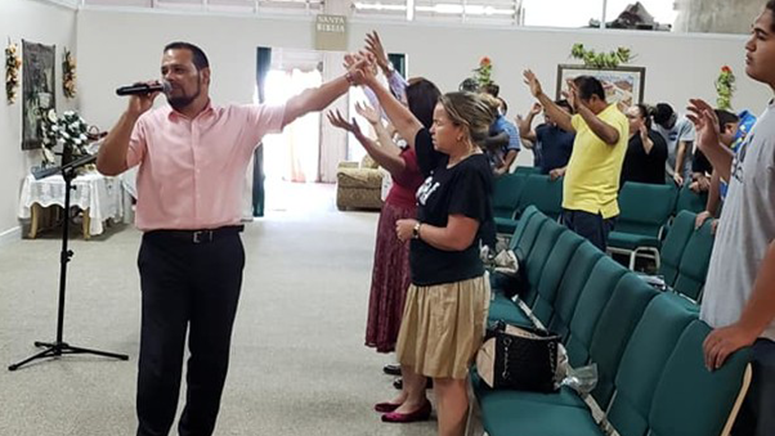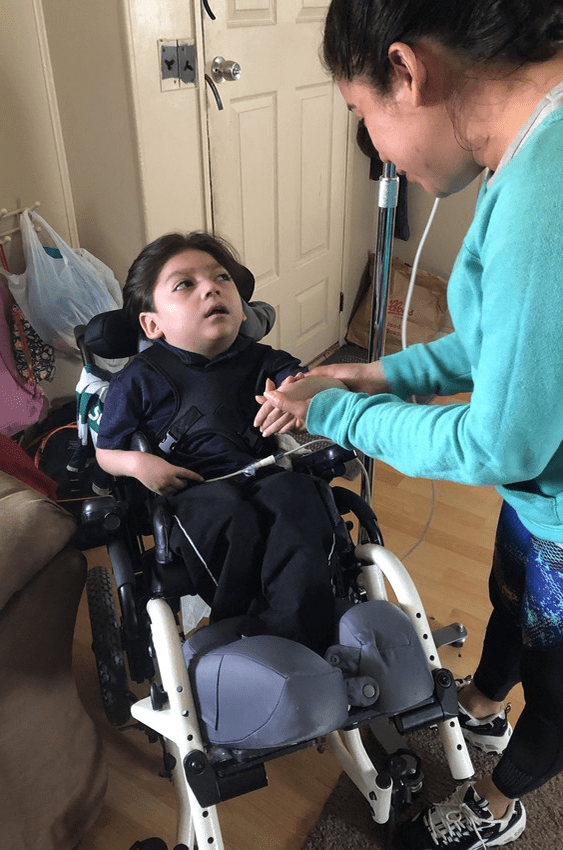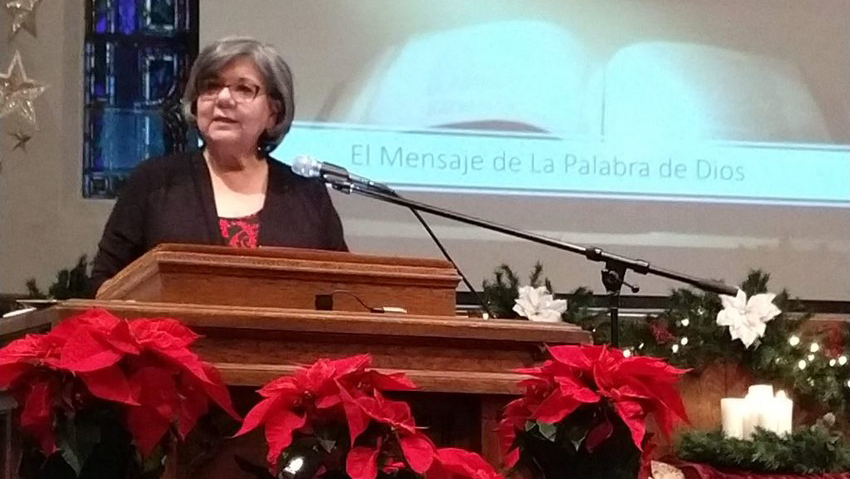Grants provide help for Anabaptist churches facing financial crisis
Since the COVID-19 Congregational Relief Fund's launch on April 13, more than 300 grant applications have been received from churches facing financial hardships
In May 2019, Pastor Elias Jaime leads worship at Ministerio Internacionál Fuego en la Palabra (International Fire in the Word Ministry) in Hialeah Gardens, Florida, before the COVID-19 crisis began. The grant will help the church pay rent while its members aren’t working. (Photo courtesy of Ministerio Internacionál Fuego en la Palabra/MCC.)
In mid-March 2020, when U.S. states began issuing stay-at-home orders and requiring some businesses to close due to the COVID-19 pandemic, Pastor Graciela Tijerina picked up the phone and called every member of her congregation. Perla, a member of Iglesia Menonita Casa Betania (Bethany House Mennonite Church) holds the hand of her 6-year-old son, Elios, who has cerebral palsy. When the COVID-19 crisis shut down businesses, Perla worried about affording necessities like diapers for her son. (Last names are withheld for their security.) (Photo courtesy of Iglesia Menonita Casa Betania/MCC.)
“What are your needs?” she asked each person.
Tijerina knew her congregation was likely to be facing serious financial hardship. She is the pastor of Iglesia Menonita Casa Betania (Bethany House Mennonite Church) in Newton, Kansas, a small, mostly Hispanic congregation that is part of the Western District Conference of Mennonite Church USA.
The church’s 36 members are almost all recent immigrants from Mexico. Many who worked as hotel cleaners or restaurant workers lost their jobs due to shutdowns. With little savings, no documentation and no access to government benefits like food stamps, loss of income could be devastating.

Assistance is on the way for the church, through a grant provided by the COVID-19 Congregational Relief Fund. This fund was launched on April 13 through a partnership between Mennonite Disaster Service (MDS), Everence® and Mennonite Central Committee (MCC) U.S. to help Anabaptist and related churches facing financial crisis due to COVID-19. Since its launch, more than 300 applications have been received.
Together, these organizations have committed $800,000 to the COVID-19 Congregational Relief Fund and more than $12,000 has come from private donors. Additional individual donations to support the fund are welcome.
Churches can submit grant requests of up to $5,000 to help meet church financial needs like rent, utilities and staff salaries, or to provide assistance to struggling church members.
Priority is given to racially and ethnically diverse churches with annual budgets of less than $50,000 serving in historically under-resourced communities. A portion of the fund also will support international churches through the Mennonite World Conference Global Church Sharing Fund.
In Brownsville, Texas, Pastor Maria Bennett will use the grant to help relieve the “stress and mental anguish” the pandemic has caused undocumented families in her congregation, Iglesia Menonita Nuevo Amanecer (New Dawn Mennonite Church) of Mennonite Church USA.
One of these church members, Janira (last name withheld for her security), is a single mother with four children living in a two-room house. Even if she could find work, Janira has to stay home to watch her children because schools are closed. She is struggling to pay rent and utilities.
The pandemic has increased the vulnerability of undocumented people, says Bennett. Lack of income, transportation, education, technology and English language skills leaves them struggling to afford basic necessities and to help their children with remote learning.
In Hialeah Gardens, Florida, Pastor Elias Jaime says the funds may be used to keep leasing the church building where his Brethren in Christ U.S. congregation has been meeting for almost 12 years. In April they couldn’t pay the rent.
All 35-50 people who attend Ministerio Internacionál Fuego en la Palabra (International Fire in the Word Ministry) have lost their jobs. Although the leasing company waived the late fees, the church will be required to pay its rent in full to continue meeting in the building in the future.
Jaime also worries the church will no longer be able to afford its ministries and social programs. Before the pandemic, the congregation regularly distributed food, water and hygiene products to homeless people in downtown Miami. The church also had been sending funds to help a church plant in Nicaragua construct a building of its own.
“We definitely need the support,” said Jaime. “I give thanks for this opportunity and am grateful.”
For the pastor of two Mennonite Brethren churches in Central California, the grant signifies hope in a fearful time. Cristobal Aleman is the pastor of Iglesia Hermanos Menonita West Park (West Park Mennonite Brethren Church), which has 50-60 members. He also pastors 35-40-members at Iglesia de la Comunidad (Community Church) in Raisin City.
Aleman says fear is one of the biggest effects of the pandemic. Many church members, a number of whom are undocumented, feel deeply insecure after losing their jobs because they lack access to government aid or health insurance.
Many members also are afraid of contracting COVID-19, although so far no one has. Aleman says five members have left him instructions, similar to wills, for what to do if they die.
In Aleman’s churches, the grant will be used toward providing food and utilities for members, funds for a Raisin City assistant pastor who hasn’t been receiving a salary during the crisis, and social programs such as two food banks run by the churches. But the grant also provides intangible benefits like a sense of comfort and community, Aleman says.
“The grant helps pastors emotionally,” he adds. “They don’t feel they’re alone—we’re all together, part of a family. The grant brings joy in the middle of the pandemic.”
Individuals can give online to the COVID-19 Congregational Relief Fund through MDS’ website at mds.mennonite.net/covid-19-donations. Checks can be mailed to Everence Foundation, Attn: COVID-19 Congregational Relief Fund, PO Box 483, Goshen, IN 46527. More information and application instructions may be found at everence.com/COVID-19-congregational-relief-fund.
Graciela Tijerina delivers a sermon in 2019 at Iglesia Menonita Casa Betania (Bethany House Mennonite Church) in Newton, Kansas, a small, mostly Hispanic congregation that will use its grant to help its members cope with the economic impact of the coronavirus. (Photo courtesy of Iglesia Menonita Casa Betania/MCC.)
